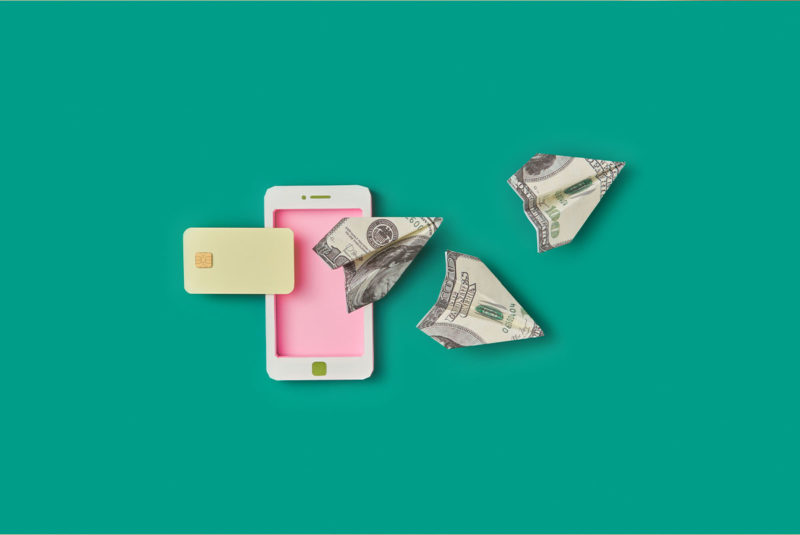Studying abroad is a unique experience. It’s a great opportunity to travel and immerse yourself in a new culture.
New customs, new people, new food — and a new set of financial responsibilities. It can be hard to spend smart, especially with an entirely different currency and the burden of an exchange rate.
A credit card can be a free and convenient way to safely carry spending power without the same risks as cash or a debit card. However, if not used responsibly, a credit card can quickly become very expensive.
We’ll talk about what makes a credit card great for studying abroad in a moment. But first, here’s a glance at our three top picks:
- Bank of America® Travel Rewards Credit Card for Students
- Journey Student Rewards from Capital One
- Deserve® Edu Mastercard for Students
What Type of Credit Card Should You Get?
If you have a limited credit history, your card options will be limited to certain cards for students. But if you’ve built up average, good, or excellent credit, you have many other options – from basic rewards to premium travel credit cards.
Credit cards are convenient when traveling abroad, but you don’t necessarily have to apply for your own. Instead, you can become an authorized user on someone else’s card (like a parent’s) and just use a copy of that.
Being an authorized user would be a great strategy if your parents have a premium travel card, like The Platinum Card® from American Express or Chase Sapphire Reserve®, because you’d get perks like airport lounge access and hotel status. But make sure the person has managed the account responsibly and will continue to do so, because that activity will affect your credit scores.
Now without further ado, let’s get to the card picks.
What Are the Best Credit Cards for College Students Studying Abroad?
When you visit MoneyTips, we want you to know that you can trust what’s in front of you. We are an authoritative source of accurate and relevant financial guidance. When MoneyTips content contains a link to partner or sponsor affiliated content, we’ll clearly indicate where that happens. Any opinions, analyses, reviews or recommendations expressed in our content are of the author alone, and have not been reviewed, approved or otherwise endorsed by the advertiser.
We make every effort to provide up-to-date information; however, we do not guarantee the accuracy of the information presented. Consumers should verify terms and conditions with the institution providing the products. Some articles may contain sponsored content, content about affiliated entities or content about clients in the network. While reasonable efforts are made to maintain accurate information, the information is presented without warranty.
Here are our three top choices for students spending their semesters abroad:
- Bank of America® Travel Rewards Credit Card for Students
- Journey Student Rewards from Capital One
- Deserve® Edu Mastercard
Bank of America® Travel Rewards Credit Card for Student
The Bank of America® Travel Rewards Credit Card for Students hits all the right notes: Visa, no annual fee, no foreign transaction fee, chip-and-PIN capability — and a decent rewards program!
All on a card designed for students without a significant credit history. We think this should be the number one pick for most traveling academics.
Journey Student Rewards from Capital One
The Journey Student Rewards from Capital One is a cash back card made for college students, but in this case you don’t actually have to be a student to qualify.
This is a Mastercard with no foreign transaction fees and minor rewards, but it doesn’t have chip-and-PIN capability. So it’s a good option (and could give you a higher credit limit than most student credit cards) but you might want a backup PIN card too.
Deserve® Edu Mastercard for Students
The Deserve® Edu Mastercard for Students is a bit like the Journey Student card above. It’s a Mastercard designed for students with limited credit history, with no annual fee and no chip-and-PIN capability.
But the Deserve® Edu Mastercard for Students may be easier to qualify for, especially for anyone with a thin credit file. That’s because it considers more than the typical factors when you apply. Beyond just your credit scores and finances, Deserve will also look into your education, future employability and earnings potential.
Not only that, Deserve doesn’t require an SSN for international students — a rare feature that could be a deciding factor.
Why Bring a Credit Card to Study Abroad?
Bringing a credit card (or two) when studying abroad can smooth things over and help you get more out of the experience.
Compared to cash and debit cards, credit cards can be:
- More convenient
- Cheaper
- Safer
You’ll need cash sometimes, of course, but credit cards for studying abroad can help you save time and money.
You won’t have to make as many trips to the ATM, paying international withdrawal fees every time. Out-of-service ATMs can send you scrambling if you rely on cash, but, armed with one or two credit cards, you’ll be ready for most situations. Avoid the fees at currency exchange counters and for cashing travelers checks by paying with credit cards. You can even get cards with no foreign transaction fees – those should be at the top of your list.
Maybe you’ll be out on the town and you want to splurge on an interesting experience or a delicacy you’ve never tried before (credit card concierge services can help you find fun stuff to do). But carrying a lot of cash isn’t usually a great idea, even at home.
If a pickpocket snags your wallet and the $300 inside, you can probably bid it all a fond farewell. But if he only gets your credit card, you can simply call and have it canceled and replaced. Most cards offer $0 fraud liability policies, so you wouldn’t be on the hook if the thief goes on a spending spree before you cancel. Just be sure to contact your card issuer as soon as you realize the card’s gone.
You shouldn’t be without your card for too long if that happens. There’s usually no fee for card replacement, though it may take ten business days or longer. In an emergency you can often get a new card in as little as one to three business days – but most likely for a fee for expedited delivery. Those fees may sometimes be waived in cases of fraud (or if you get a sympathetic rep).
Everyday problems can become big headaches when you’re far from home. But credit cards can have your back with a surprising number of lesser-known protections. If something goes wrong, like a new camera breaks or the airline loses your bags, you could be fully reimbursed for any eligible expenses. Depending on your specific card, you may have access to a host of benefits that typically don’t come with debit cards.
Emergencies are easier to handle with credit cards, too. You could charge a hospital bill or last-minute flight to a credit card and deal with it when you have more time on your hands. You can often get an emergency cash advance if you’re really in a pinch. Some cards even offer emergency medical evacuation. And if someone steals your identity while you’re vulnerable in an unfamiliar country, many cards offer ID theft resolution services to help you straighten things out.
Credit Card Tips for Studying Abroad
Keep these tips in mind, whether you’re looking to get a new card or already have one that you’ll be using abroad.
How do you find a credit card to use abroad?
- Network acceptance: Choose a credit card that’s widely accepted — that usually means a Visa or Mastercard, if possible. But research the card acceptance rates wherever you’ll be traveling. Discover, for example, has fairly broad acceptance in China, Japan and some other countries. If you’re looking for your first credit card, choose one that will be good in the U.S. and abroad.
- Foreign transaction fees: A card with no foreign transaction fees would be best, like most of the options on this page. Many credit cards charge a 3% fee on top of every purchase made in a foreign currency, but there are also plenty of cards with no fees.
- Travel protections: Lost your bags? Flight’s late? Some credit cards have benefits to reimburse expenses when your travel plans go awry, which could save you thousands of dollars and some big headaches.
- Chip-and-PIN: To maximize compatibility abroad, pick a card with chip-and-PIN capability. Many cards in the U.S. only use chip-and-Signature, which is not accepted everywhere abroad. Some unattended self-service terminals may require a PIN because there’s nobody there to check your signature.
- Explore your options: If you don’t have credit established already, you could ask someone you trust with good credit history, like a parent, to add you as an authorized user. Then you’d get your own copy of a card for traveling.
- Use credit cards responsibly: If you’re new to credit cards and building credit, read our guide to building credit with credit cards and ask us any questions you have.
How Do You Use a Credit Card Abroad?
- Set a travel notice: Contact your card issuer in advance to let it know you’ll be abroad and provide a list of your potential travel destinations. Setting a travel notice or alert will help prevent your card from being declined for possible fraud.
- Be prepared: Sign the back of your credit card and carry photo identification. European countries take theft seriously and merchants may refuse your card if they think it’s stolen. Signing for credit card transactions is not normal in other parts of the world (where they use PINs), so expect merchants to examine your signature closely.
- Have a backup: Having more than one payment method can be useful if one of your cards doesn’t work or is stolen. That could be a couple of credit cards and a debit card, spanning two or three networks, like one Visa, one Mastercard and one American Express card.
- Exchange rates: Make sure you understand how exchange rates work and what the cost would be in U.S. dollars for anything you’re buying. For example, if the current exchange rate of USD to Euros is $1 to €0.89, you’ll be paying $1.12 for every Euro you spend. At that rate, if you buy something on your credit card for €200 you’ll owe your credit card company $223.59.
- Get help when you need it: If your parents are helping fund your study abroad adventure, they can make direct payments to your credit card from home without having to send you money.
Avoid cash advances: Don’t borrow cash from your credit card issuer, unless it’s an extreme emergency. Cash advances are very expensive and can show the lender you’re being irresponsible — not the kind of signal you want to give when you’re building credit.



